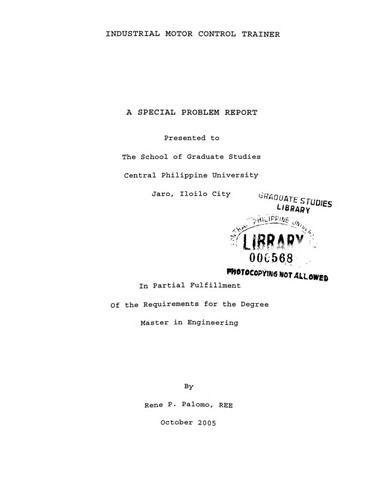Development and evaluation of gross motor skills assessment tool for children with autism
요약
This research study aimed to develop and evaluate a gross motor assessment tool for children with autism. The ADDIE (Analysis, Design, Develop, Implement and Evaluate) Model was used as its research design. There were three (3) phases identified in the conduct of the research. Phase 1 was the needs analysis phase, and a focus group discussion (FGD) was employed with six special and early childhood educators to identify basic skills needed in teaching gross motor to children with autism. Phase 2 was the design and development phase. Inputs from Physical and Special Education experts were generated to organize the items that were included in the assessment tool. The third and last phase was the implementation and development phase. In this phase, assessment of the developed gross motor assessment tool was done. It employed thirty-four (34) learners with autism to participate in the study. The tool was used to determine the baseline gross motor skills of children with autism. After four weeks of implementing a gross motor program, the same tool was used to determine again these skills to check if these children improved in particular skill or not. In the evaluation phase, the assessment tool was given to three (3) experts. Two (2) from the field of Physical Education and one (1) from Special Education. Feedback and rating scale were provided to them to use in their evaluation of the given assessment tool. Result of the research showed that there is an existing standardized tool that is being used by teachers in assessing gross motor skills, but it is intended for regular students and no standardized test for students with autism. The design and development of the gross motor assessment tool generated ten (10) significant items that were needed to clearly evaluate the child with autism in terms of its gross motors. These items were balance, coordination, walking, running, hopping, jumping, sliding, skipping, leaping and galloping. It showed that these skills were considered to be important in the assessment tool having have a high factor loading value and is very reliable with a Cronbach Alpha of 0.875. The feedback of the teachers were also generated and has emphasized the importance of assessing and evaluating the gross motor skills of students as it is one crucial skills for them to move on a higher and complex skills for these children to maximize their potential as individuals.
기술
Abstract only
추천 인용
Magno, N. C. (2021). Development and evaluation of gross motor skills assessment tool for children with autism (Unpublished Doctoral dissertation). Filamer Christian University, Roxas City, Capiz.
유형
Thesis주제
학과
Graduate School정도
Doctor of Education (Physical Education)선반 위치
GSL Theses 378.242 M275d
물리적 설명
xvii, 171 leaves
Collections
- Dissertations [6]
Related items
Showing items related by title, author, creator and subject.
-
Development of instructional videos on fundamental movement skills: Supplementary materials for special education
Alavata, Candelaria E. (Central Philippine University, 2025-05)The primary purpose of this study was to develop an instructional video on fundamental movement skills as a supplementary resource for special education teachers. This video aimed to assist special education teachers in ... -
Forbes Fleet management system
Abadia, Louis; Balogo, Marresa Kae; Calesterio, Kenn; Queque, Marijhose Micah; Reyes, Dennis Joseph (2014)The study designed to develop a Forbes Fleet Management System. It focuses on the following objectives: (1) Develop a driver’s profiling module to create an organized record for drivers and a database to keep those records; ... -
Industrial motor control trainer
Palomo, Rene P. (2005)The study of an Industrial Motor Control Trainer for the students is a contribution to the Electrical Engineering Department of Western Visayas College of Science and Technology. It is a solution to the students’ problem ...





